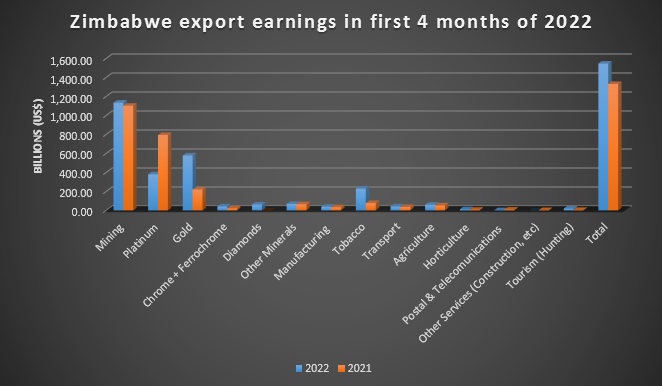
Mining, Tobacco tops export earnings in first 4 months
…more can be realised if we add value
By Almot Maqolo
HARARE – In the first four of 2022, the mining and tobacco sector form the biggest percentage of the export receipts underpinned by good prices on the world market. The mining sector in Zimbabwe contributes immensely to the economy, it being the main source of forex for the southern African nation’s coffers. The mining industry, which is the largest earner of foreign currency, is critical to the southern African country’s economy, and the government expects that by 2030, the industry will be generating more than US$20 billion On the other hand, tobacco is the country’s second foreign currency earner after gold, with China and South Africa being the major buyers of the golden leaf. Other top buyers of flue-cured tobacco from Zimbabwe are the United Arab Emirates, Indonesia and Belgium.
Meanwhile, the value of Zimbabwe’s total export earnings rose 16% to US$1.546 billion in the first four months of this year from US$1.331 billion received in the prior comparative period. At US$1.13 billion, the mining sector accounted for 73% of the total export receipts. Of the total, the yellow metal contributed 579.4 million. As expected due to firm global prices exacerbated by the ongoing Russia-Ukraine has overtaken platinum as the highest earner in the mining sector. It is slowly peeking up to take its pole position from diaspora remittances. The southern African nation, which is home to the world’s second biggest known deposits of platinum after South Africa, has three platinum-producing mines namely Zimplats, Mimosa and Unki. Platinum came in with US$380.9 million.

Zimbabwe’s history of diamond exploration and mining had all but vanished during the many years of economic isolation under President Robert Mugabe’s political regime. Following Mugabe’s downfall, investors’ appetite to invest in the country has been rising on the strength of the new government’s favourable stance to foreign investment. Recent amendments to the country’s mining law have reaffirmed the new government’s intention to further open the country to foreign investment. The controversial indigenisation policy which had caused concern among foreign mining firms has been amended. Diamonds contributed US$62.3 million.
Chrome ore + Ferrochrome were the least contributors with US$43 million. However, there is a need for a more serious approach towards mineral beneficiation in order for the country to narrow its trade deficit by exporting more valuable minerals. The major challenge to value addition has been the lack of huge incentives to lure potential investors into it and incentives that can encourage miners to add value to their produce locally. Major minerals produced in the country such as nickel concentrates and nickel mattes were exported in a semi-processed form, while nickel ores are exported in a raw form. The African government should up their game to force mining companies to process minerals before export. From the non-minerals, tobacco contributed US$230.8 million during the period under review on good prices.
While the country is the largest producer of tobacco in Africa, targets to improve value addition from the current 2% to at least 30% by 2023. Value addition creates more employment, high disposableincome and promotes increased demand for goods and services. It also ensures increase in export earnings as the products become more competitive on the international market. Also the southern African aims to localise the financing of golden leaf production, with the government committed to put in some seed money of at least US$60 million.Last year, the country sold 186.6 million kg of tobacco leaf valued at 515.9 million U.S. dollars during the 2021 marketing season, up 16.8 percent in volume and 31 percent in value over the 2020 sales.
Traditionally, the opening of tobacco auction floors leads to improved foreign exchange inflows in the country, with buyers scrambling to purchase the crop. As a matter of fact, it is high time that the country needs to treat farmers as equal contributors to the economic development by “benefiting from their sweat”. Financial institutions should play their part in making sure that farmers get their money in time. So that they do not spend much time or days waiting for payments – burdening them with more expenses. At least 106.45 million kilograms of tobacco worth US$317.55 million have been sold so far at auction and contract floors in the country since the selling season opened on March 30 this year, statistics from the industry regulator show.


